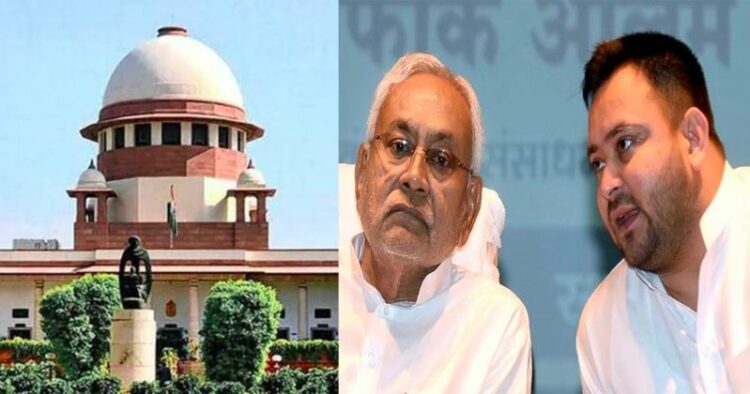On May 18, the Supreme Court refused to interfere with Patna High Court’s interim order granting a stay on Nitish Kumar-led Bihar Government’s ‘caste-based survey.’ The Patna High Court had prima facie held that the caste-based ‘survey’ amounts to a census which only the Government of India has the power to carry out.
The Supreme Court said that it would keep the matter pending as the Patna High Court would hear the matter on July 3 and that if the Patna High Court does not hear the matter then the Supreme Court will hear arguments on July 14.
The Supreme Court said, “We direct that this petition be listed on 14th July. If for any reason hearing of the Writ Petition does not commence before the next date we will hear further submission canvassed by the Senior Counsel for the petitioner.”
“Why should we interfere at this stage. The High Court will go into it on 3rd July…High Court has recorded prima facie findings. We are not saying we will affirm the findings or we would interfere. We are only saying that it is difficult to grant today. We are not saying that we will not hear it,” the Supreme Court added.
The Bihar Government’s counsel Senior Advocate Shyam Divan contended that the government has already mobilized resources for the survey and that the process is essential to procure ‘quantifiable data’ for formulating policies. The Supreme Court replied that it will have to determine whether it is a survey or a census as “A lot of documents show it is census only.”
Thereafter, Divan tried to create a distinction between a survey and a census, arguing that while the former is voluntary the latter is mandatory in nature. He said, “This is the first point of distinction. For census you have respond. If you don’t you are met with penalty. Not so for survey. There are three constitutional entries in List III which supports inquiries and collection of data.”
Furthermore, on the issue of data privacy, Divan argued that the government has given adequate assurances to secure data confidentiality and said, “Data would be stored only on the servers of the Govt of Bihar and not on any other cloud…It is a full proof system. We are open to suggestion by the Court.”
Patna High Court stays the ‘Caste-Based Census’
On June 2, 2022, the Bihar cabinet took the decision to conduct a caste census in the state. The caste census was supposed to cover an estimated population of 12.70 crores in an estimated 2.58 crore households in 38 districts, which have 534 blocks and 261 urban local bodies.
On May 4, the Patna High Court had prima facie held that the caste-based ‘survey’ amounts to a census which only the Government of India has the power to carry out. The court stated, “On the above reasoning, we find that the caste-based survey is a census in the garb of a survey; the power to carry out which is exclusively on the Union Parliament which has also enacted a Census Act, 1948.”
The Patna High Court stated, “We are convinced that the survey, in the manner in which it is carried out, cannot be said to be within the policy realm of the State. Even the defence raised was to source the State’s power to legislate under the Concurrent List; which we have found to be untenable.”
The Patna High Court noted, “It is the vehement contention of the State that the entire data now collected is available in the public domain; different individuals having given it for the purpose of availing reservation, social welfare measures, getting employment and so on and so forth. If the details are available in the public domain, we fail to understand why such a massive exercise, expending public resources has to be undertaken.”
The Patna High Court said, “We are of the considered opinion that the petitioners have made out a prima facie case against the continuation of the process of caste-based survey, as attempted by the State of Bihar. There is also the question raised of data integrity and security which has to be more elaborately addressed by the State.”
Furthermore, the court held, “Prima facie, we are of the opinion that the State has no power to carry out a caste-based survey, in the manner in which it is fashioned now, which would amount to a census, thus impinging upon the legislative power of the Union Parliament. We also see from the notification issued that the Government intends to share data with the leaders of different parties of the State Assembly, the ruling party and opposition party which is also a matter of great concern. There definitely arises the larger question of right to privacy, which the Hon’ble Supreme Court has held to be a facet of right to life.”




















Comments